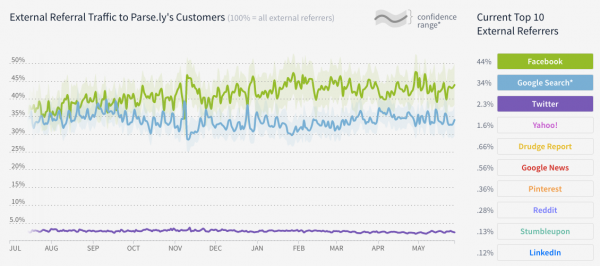Platforms and Publishers: It’s Complicated

Platforms and publishers have a very Ross/Rachel story arc—one minute they’re getting along, then they’re on a break, and then Ross changes his algorithm and nobody knows where they stand anymore.
What do digital media professionals really think about the complex relationship between platforms, the content publishers create, and their audiences? We asked a few at the Digiday Publisher Summit in Vail, Colorado.
Whether publishers view platforms’ role in distributed content as helpful or harmful depends on several factors, especially referral traffic, reaching new audiences, and monetization.
Audience Scale vs. Monetization: The Case Against Platforms
Platforms matter when it comes to reader discovery. Facebook and Google drive approximately 75% of external referrer traffic to articles in Parse.ly’s network of publishers. And while other platforms drive less from an aggregate perspective, each platform can vary greatly by topic or audience. Twitter only drives 1.5% of referral traffic to publishers in the Parse.ly network, but Kurt Mueller, COO of The Onion, says of his publication’s complicated relationship with Twitter: “Good audience driver for us, [but] not a huge monetization engine.”

Monetization is also an issue with Google Search. Jed Hartman, CRO of the Washington Post, elaborates, “[Google Search does] good things in technology and help[s] the industry, but they also gobble up a lot of the money that could be ours.”
Andrea Mazey, Director of Online and Video Partnerships at Bonnier, finds the speed at which platforms change to be a hurdle for monetization. She explains, “Basically every three to five years in this industry we have a completely new platform to create content for and zero ways to monetize it, so it’s always a challenge.”
Making the Relationship Work: The Case For Platforms
Publishers conceded that platforms have been making more of an effort of late. In January, on the heels of fake news controversies, Facebook hired Campbell Brown to build better relationships with news organizations. Facebook has launched a training program for local newsrooms and adjusted its trending topics section to prevent fake news and puncture filter bubbles. Google has also created a fact-check feature to combat fake news.
Jed Hartman, CRO of the Washington Post, says of Facebook, “We lean in and so they lean in, so we can have a good dialogue and good relationship.”
Some publishers are finding more success than others in reaching audiences through platforms, depending on their niche. Business publishers, for example, have seen traffic increases on LinkedIn, even though the platform drives less than 1% of overall referral traffic.
The Washington Post has also seen good results with Snapchat. Jed Hartman explains, “The early numbers are excellent. They’re very good to work with. They’re very creative to come up with a new version of The Washington Post on Snapchat to reach a totally new audience.”
Can Platforms and Publishers Meet in the Middle?
How publishers feel about platforms boils down to a catch-22. Audiences spend time on social platforms, so publishers can’t ignore the distribution power, but they aren’t always able to monetize or exert control over the content they create.
Andrea Mazey says about Google Search, “They’re just so big, and so almighty, it’s difficult to get any sort of personal attention. You’re sort of always on their terms.”
“They’re in it for themselves,” Kurt Mueller says of YouTube. “All of these platform partners are.”
The good news is publishers have found ways to shift the balance of power. While some publishers are forming partnerships with each other in order to capitalize on ad dollars, others are confronting the duopoly by adapting to business models that aren’t reliant on ads. Instead of search and social, loyalty could become a primary driver of revenue. The Guardian and The New York Times, for example, have both seen an increase in reader support.
If change happens, it will come about slowly, but there’s potential for the story of platforms vs. publishers to have a happy—if not uncomplicated—ending.